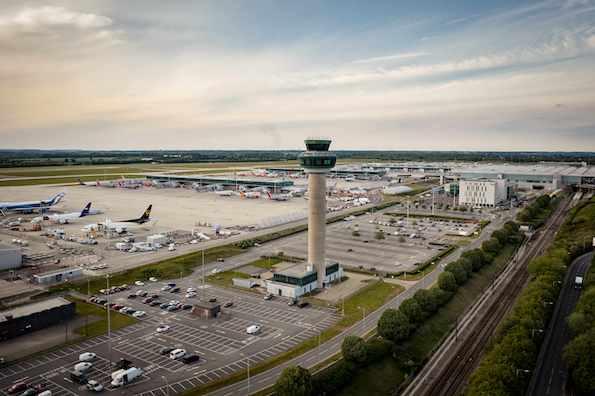
London Stansted Airport.
GENEVA—On June 1, Borussia Dortmund will play Real Madrid in the UEFA Champions League final at London's Wembley Stadium. Fans from Germany and Spain will be joined by thousands of corporate sponsors and their guests. Any one of them who assumes they will be able to fly out of the UK after the match finishes around 10 p.m., though, might be in for a surprise. June 1 marks the beginning of the UK's aviation summer season, and from then through Sept. 30, it will be impossible to operate an ad hoc flight between 11 p.m. and 6 a.m. from London's most used airports.
"This is the only city in Europe where this is happening," says Lindsey Oliver, managing director of the British Business and General Aviation Association (BBGA), the UK's business aviation trade group. "We used to have a handful of weekly night slots available—those have now gone."
London's main business aviation airports—Biggin Hill and Farnborough—are closed at night; the former cannot operate after 11 p.m., and the latter ceases flights at 8 p.m. on weekends. Stansted and Luton airports, the two London hubs with significant business aviation traffic, generally have a small number of ad hoc night slots available. But increasingly in the years prior to the COVID-19 pandemic and again this year, these have been withdrawn for the busy summer season.
"Luton operates its slot allocation under local planning laws, but they largely copy the slot controls elsewhere," Oliver says. "Stansted operates on movement limits set by the government, and those limits are then managed by the airport owners, MAG [Manchester Airport Group]. And MAG has removed ad hoc slots in the night during the summer season."
The BBGA wrote to the aviation minister, Anthony Browne, highlighting the difficulties this would pose for the business aviation sector and the potential negative impact on the UK economy. In a written reply, the Department for Transport told the association that the decision to withhold ad hoc night slots at Stansted was taken by MAG for commercial reasons and that the department would not intervene. Oliver notes that airports are heavily fined if night flights take place outside allocated slots, and, by taking night slots away from ad hoc operators, the airport will have headroom for when scheduled services are delayed.
The BBGA challenged the department’s decision, but events have overtaken its lobbying effort. Parliament has been dissolved ahead of a July 4 general election, announced by Prime Minister Rishi Sunak on May 22. As a result, BBGA CEO Marc Bailey says any hope for a change this summer is now "dead in the water."
There are some options for those prepared to travel a little farther to get on a late flight. London Oxford Airport can operate until midnight, while London Southend Airport is open 24 hr. However, Oliver points out that Southend and Birmingham, which is over 100 mi. from London, would not be good options for last-minute travel.
"The ground-handling services at both [Birmingham and Southend] are under serious pressure," she says. "We've already been told that you need to be booking in advance to get that ground handling availability if you're going to be going into those airports. The extra hour at Oxford is going to be quite critical this summer."
Limited ramp space is another problem at Luton, but it is elsewhere in Europe where aircraft parking issues are having a significant impact. Again, this appears to be another challenge caused in part by growing airline traffic and the pressures it is placing on airports.
"In Greece, the airlines complained that private aircraft coming from abroad were being given priority, so when [airlines] went from Athens to the islands, their passengers missed connecting flights," says Kevin Singh, a Global 6000 pilot and CEO of Icarus Jet, a Dallas- and London-based charter and flight-support firm. "And then two aircraft had a wingtip collision in Mykonos, because of all the [general aviation] activity, and the ramp is so small. So they complained to the government, and now you can't park anywhere in the [Greek] islands."
Private jets flying to airports like Kos or Mykonos are limited to 45 min. on the ground. As a result, Singh says, aircraft are having to go as far as Croatia or Cyprus to find parking—adding up to an hour of empty flying. The result is an increase in bizav emissions and further erosion of the sector's already contentious public image.
Business aviation is reaping the results of commercial aviation's failures, Singh argues.
"The reason private aircraft exist is because the airline infrastructure is broken nine days to Sunday," he says. "And it's funded by taxpayers to be broken over and over again."
The answer, he argues, is twofold.
"Within a decade, the technology will help us with congestion; we can design ramps per the dimensions of particular aircraft and pack them like a sardine can," Singh says. "Short term, we need to hire more people—more pilots, more flight attendants, more ground handlers. That's how you advance the economy."
And if that means airports put up prices for business jets?
"Mykonos started charging €3,000 [$3,255] if you land there with a passenger, just to use the lounge, which is mandatory anyway," he says. "Nobody said 'No'. The traffic did not go down. Corfu followed suit; this year Kos followed suit. France has added noise taxes; Switzerland has pollution taxes. I don't think most billionaires will ever complain if it's a matter of saving two extra hours in their life."





